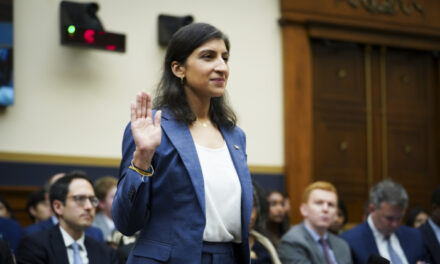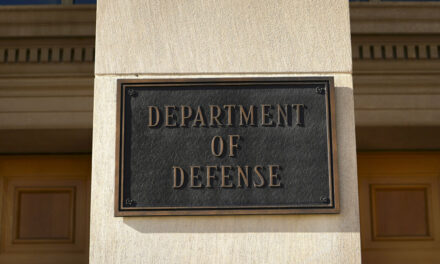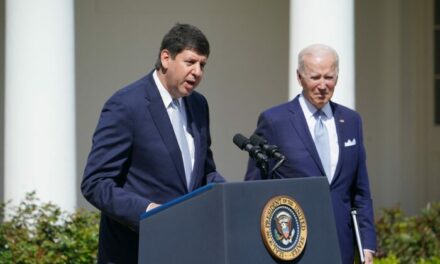We support our Publishers and Content Creators. You can view this story on their website by CLICKING HERE.
Both the Trump and Biden administrations have warned about rising risks in the Arctic over the last 8 years.
WASHINGTON—President-elect Donald Trump’s recent remarks about potentially using military or economic measures to control Greenland have sparked global concerns. While some view his comments as extreme, there is a longstanding consensus within the U.S. national security community that China’s and Russia’s growing influence in the Arctic is worrisome and demands immediate attention.
Trump has made similar statements regarding the Panama Canal, expressing frustration over the growing influence of Chinese state-owned companies in its operations.
“I’m not going to commit to that,” Trump said on Jan. 7 when asked if he would rule out using military or economic coercion to control both Greenland and the Panama Canal.
His comments during a press conference at his Mar-a-Lago resort left many reporters puzzled, prompting repeated questions for clarification.
He emphasized that the United States needs both regions for economic and national security reasons.
One of the benefits of Trump’s approach, whether intentional or not, is that it creates public discourse on issues that would typically be handled behind the scenes, Michael Walsh, a U.S. foreign policy expert, told The Epoch Times.
“It stirs discussion and debate. And you’re seeing that right now. You hear people on the metro talking about Greenland and Panama,” Walsh said.
For many, it’s unclear whether Trump intends to use military force or if he’s suggesting it as a negotiation tactic to change the status quo in both regions.
“It could be a negotiating tactic—who knows?” Walsh added.
However, he noted that understanding the context is important for the public to interpret Trump’s remarks.
“One of the problems with this whole narrative that’s happening is that people don’t understand the context. Even most political leaders don’t understand the context,” he said, referring to the rising risks in Greenland, the world’s largest island.
Walsh, who served as an adviser on Asia-Pacific security affairs for President Joe Biden’s 2020 presidential campaign, highlighted U.S. concerns about the independence of Greenland and the Faroe Islands—two autonomous territories of Denmark.
While Trump has only mentioned Greenland, the United States has been concerned about both territories, he noted.
During Trump’s first term, the State Department worked to deepen ties with both islands to counter Russian and Chinese activity in the Arctic. These concerns persisted under Biden, who introduced an Arctic strategy in 2022 to counter growing competition, especially China’s “Polar Silk Road.” Walsh noted that both administrations share similar views on the risks in the region.
“There’s not a huge daylight between the two administrations in terms of the assessment that there’s a risk in the region,” Walsh said.
Despite Denmark being a close NATO ally, the United States fears that Denmark’s influence over these islands could fade over time if they move toward independence.
Over the past eight years, risks have grown, partly due to domestic political dynamics in Denmark regarding the islands.
“The U.S. and Denmark have had a long-standing partnership, and it’s worked really well,” Walsh said. “I think that the concern is that they might not be the partner of the United States in Greenland or the Faroe Islands in the future, if they become independent.”
Danish foreign minister Lars Løkke Rasmussen said on Jan. 8 that Greenland may become independent, but it’s unlikely to become a U.S. state.
“We fully recognize that Greenland has its own ambitions. If they materialize, Greenland will become independent, though hardly with an ambition to become a federal state in the United States,” Rasmussen said.
On Jan. 8, the government of Greenland also responded to Trump’s comments, stating that “Greenland belongs to the Greenlanders” and that its future will be determined by its own people.
However, Greenland expressed interest in strengthening ties with the United States, particularly in economic cooperation, mining, and development of its mineral resources. Greenland also emphasized its commitment to working with the United States and NATO allies to ensure security and stability in the Arctic, acknowledging the changing political dynamics in the region.
“The Cabinet is looking forward to building relations with President-elect Donald Trump and his administration,” the statement read.
Competition in the Arctic
China in recent years has been ambitiously developing its commercial and military capabilities in the Arctic. In addition, Russian and Chinese warships are operating together more frequently in the region.
Pituffik Space Base (formerly Thule Air Base) in Greenland, on Oct. 4, 2023. Thomas Traasdahl/Ritzau Scanpix/AFP via Getty Images
“Greenland is important because the Arctic has become important,” Gordon Chang, political commentator and China expert, told The Epoch Times. “And China and Russia are seeking to control the Arctic.”
The region was crucial during the Cold War because of the strategic sea lanes in the Atlantic, but after the Cold War, people largely forgot about their importance, Chang added.
Warming trends are driving more activity in the Arctic, which could lead to both competition and tension in the region, according to a July report by the Center for Strategic and International Studies (CSIS).
Referencing 2008 estimates from the U.S. Geological Survey, the CSIS report emphasized the region’s vast resources, including nearly 90 billion barrels of oil and 1,669 trillion cubic feet of natural gas. That represents about 22 percent of the world’s undiscovered conventional oil and natural gas.
The Arctic also has trillions of dollars worth of minerals, including silver, copper, gold, nickel, iron ore, and rare earth elements.
In addition, Greenland is home to a large U.S. military base with missile warning and space-surveillance systems.
Chang disagrees with Trump’s suggestion of using military force to take over Greenland, saying there is no justification for that.
He said that while the world isn’t peaceful, with Russia and China already using force, Trump’s comments could encourage more aggression globally.
Rep. Mike Waltz (R-Fla.), who was tapped to serve as Trump’s national security adviser, defended Trump’s remarks about Greenland.
“This is about critical minerals. This is about natural resources,” he told Fox News on Jan. 8. “The Chinese are now cranking out icebreakers and pushing up there as well. So, it’s oil and gas. It’s our national security.”
The Russian “50 Years of Victory” nuclear-powered icebreaker is seen at the North Pole on Aug. 18, 2021. Ekaterina
Anisimova/AFP via Getty Images
Waltz also said that Russia is “trying to become the king of the Arctic,” pointing out that Russia have over 60 icebreakers, while the United States has only two—one of which had to return to home port last summer due to an electrical fire.
Biden has remained silent about Trump’s remarks so far.
During a call with reporters on Jan. 8, John Kirby, spokesperson for the National Security Council, declined to comment directly, instead pointing to responses from foreign leaders.
“It would not be appropriate for us to weigh in and cast judgment,” he said, opting for a more measured answer rather than criticizing Trump’s comments about allies.
China’s Dual-Use Infrastructure
During his visit to Capitol Hill on Jan. 8, Trump was again questioned by reporters about the potential use of military force in Greenland. In response, he mentioned a recent trip to Greenland by his eldest son, Donald Trump Jr.
“We got applause as we landed yesterday,” the president-elect said, describing the reception as “like a love fest.”
Trump Jr. visited Greenland on Jan. 7 for a day trip, reportedly to shoot video content for podcasting.
Trump also reiterated his criticism of the high fees Panama imposes on the United States and its navy, particularly considering that the United States originally constructed the Panama Canal. He also made it clear that he would not allow China to gain control over the strategically important waterway.
A tanker ship enters the Panama Canal from the Pacific side on Oct. 25, 2024. Martin Bernetti/AFP via Getty Images
Chinese companies, including Landbridge Group and Hong Kong-based CK Hutchison Holdings, currently operate terminals at both ends of the canal.
Trump’s comments about the Panama Canal reflect growing concern among U.S. politicians over China’s expanding influence in Latin America. The State Department warned in 2022 that Beijing’s acquisition of technologies, facilities, and infrastructure in Latin America may have dual purposes.
In July 2022, Gen. Laura Richardson, then-head of the U.S. Southern Command, raised concerns about Chinese state-owned companies operating ports on both sides of the Panama Canal, stating that these facilities could be turned quickly toward military capabilities.
“I think we should be concerned, but this is a global problem,” she said at the Aspen Security Forum in Colorado.
“This is the same playbook that they’ve used in Africa, Asia, Europe, it’s not new.”
Trump, in recent social media posts, expressed frustration over China’s expanding influence in the canal, despite it having been built by the United States more than 110 years ago at great financial and human cost.
“Merry Christmas to all, including to the wonderful soldiers of China, who are lovingly, but illegally, operating the Panama Canal … always making certain that the United States puts in Billions of Dollars in ’repair‘ money, but will have absolutely nothing to say about ’anything,’” Trump wrote on Dec. 25, referring to the Chinese regime’s heavy influence over the waterway.
“I’m very glad that President Trump raised the issue because the Chinese, through various means, have the ability to block the canal in wartime,” Chang said.
The Panama Canal, which opened in 1914 after a decade of construction led by the United States, was gradually handed back to Panama under a 1977 treaty signed by President Jimmy Carter.
A merchant ship sails along the Panama Canal on March 23, 2015. Rodrigo Arangua/AFP via Getty Images
In 1999, Panama assumed full control of the canal, which has since become one of the busiest shipping routes in the world, connecting the Atlantic and Pacific oceans. On Dec. 31, Panama celebrated the 25th anniversary of the canal’s handover.
Under the separate 1977 Neutrality Treaty, Panama and the United States agreed that the waterway would remain permanently neutral, with fair access and tolls for all countries. Hence, any Chinese challenge to this pact may require the United States to employ military force.
“Look, the Panama Canal is vital to our country. It’s being operated by China. We gave the Panama Canal to Panama. We didn’t give it to China, and they’ve abused it. They’ve abused that gift,” Trump said during his Jan. 7 press conference.
Democratic Criticism
During his press conference, Trump also suggested renaming the Gulf of Mexico “the Gulf of America,” expressing his frustration with Mexico about migrants.
Many Democrats, however, have criticized these comments, dismissing them as distractions.
“House Democrats believe that we are not sent to Washington to invade Greenland, rename the Gulf of Mexico, or seize the Panama Canal by force,” House Minority Leader Hakeem Jeffries (D-N.Y.) said during a press conference on Jan. 8. He said their priority is addressing the rising costs facing American families.
In an interview with CNN on the same day, Sen. Elizabeth Warren (D-Mass.) criticized Trump’s remarks about the Panama Canal and Greenland, arguing that the United States has always respected the sovereignty of other nations. She pointed out that the comments served as a distraction from his controversial nominees, including Pete Hegseth, Tulsi Gabbard, and Robert F. Kennedy Jr.
Sen. Chris Murphy (D-Conn.) echoed a similar sentiment, framing Trump’s comments as an attempt to distract from his tax cuts.
Previous Military Intervention
If Trump chooses to use military force to uphold the neutrality agreement, it would not be the first instance of U.S. intervention in Panama.
Retired Lieutenant-General Keith Kellogg, who is set to serve as Trump’s special envoy for Ukraine and Russia, said he was an assault brigade commander during the invasion of Panama in 1989 during the presidency of George H. W. Bush. The purpose of the operation was to remove Panamanian leader Manuel Noriega from power.
“We actually did take the Panama Canal back in the late 80s during Operation Just Cause, and three weeks later, we gave it back to them,” Kellogg told Fox News on Jan. 8.
“I think his point about the Chinese running the canal is a good point,“ Kellogg said. Over 70 percent of the commerce that goes through the canal is American, he said, and ”it is in our vital national interest that that canal stays sovereign.”

 Conservative
Conservative  Search
Search Trending
Trending Current News
Current News 







